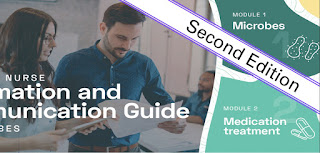Nurses in Oncology on Vaccination, AMR and Infection Controle
“Why nurses are paramount in the context of antimicrobial resistance (AMR) and vaccination for cancer patients”
Patrick Crombez, Vice President
Antimicrobial resistance will soon threaten the routine treatment of
common infections across the world and have an ever-greater impact on morbidity
and mortality in vulnerable patients like cancer patients. These patients often
are neutropenic and immunocompromising effects of the underlying disease as
well as of antineoplastic therapies, especially with the emerging new treatment
options as immunotherapy, must be considered by cancer nurses as high risk
factors for developing resistant infectious complications.
Vaccination is one of the strategies needed to counter this threat and
can be an effective preventive strategy against many infections, but type and
timing of vaccinations must be carefully chosen to allow for optimal
immunization in immunocompromised patients. Certain therapeutic interventions
result in profound immunologic challenges and requiring specific vaccination
strategies (Rieger et al. 2018).
Vaccines prompt the human body to issue an immune response to an
invading organism, preventing infection from occurring in the first place,
thereby reducing the need to use antimicrobials. The second mechanism by which viral vaccines
can reduce AMR is by prevention of inappropriate antibiotic prescriptions for secondary
bacterial infections caused by viral pathogens. Cancer patients are almost 50
times more likely to die from for example flu-related complications, yet the
vaccination uptake in this group is just over 50% (Public Health England
2018a). As in some European countries specialized (cancer) nurses may prescribe
medication, and so also antibiotics, they have a responsibility to take up and are
in a strong leadership position to promote appropriate use of antibiotics in
everyday practice.
As there is a proven direct correlation between antibiotic use and the emergence of resistance, reducing the number of antimicrobial drugs used, will have an impact on AMR and justifies why nurses have to take the leadership in programs as Antimicrobial Stewardship (AS) in order to advocate for optimal use of antimicrobials. Another key intervention is Infection Prevention and Control (IPC) measures which together with AS form a package of interventions that nurses deliver in their everyday roles.
As there is a proven direct correlation between antibiotic use and the emergence of resistance, reducing the number of antimicrobial drugs used, will have an impact on AMR and justifies why nurses have to take the leadership in programs as Antimicrobial Stewardship (AS) in order to advocate for optimal use of antimicrobials. Another key intervention is Infection Prevention and Control (IPC) measures which together with AS form a package of interventions that nurses deliver in their everyday roles.
Nurses’ knowledge about infectious epidemiology in their hospital is
paramount to participate in IPC programs.
Leadership role of nurses to support
the multidisciplinary team to apply IPC principles and best practices is
essential. The critical partnership of infection prevention, for healthcare
associated infections, and antimicrobial stewardship is not fully acknowledged,
and the role nurses undertake daily in preventing infections must be recognized
and cannot be overemphasized.
To optimize the full integration of cancer nurses in these
activities, they need to acquire knowledge based on research evidence about AMR
and vaccination to avoid misconceptions as it is often present in the general
population. It is obvious that nurses must be aware of the changing nature of
challenges to educate their patients and their families to counter
misinformation they’ve read online. The knowledge and skills of nurses and other
health professionals must be harnessed to provide education to patients, other
healthcare providers and to the public about the benefits of vaccination and
immunization and the risks of inappropriate use of antibiotics.
In conclusion
Nurses, as the largest health workforce, and nursing organizations are part of the development of robust governance on infection prevention, an increasingly complex and constantly changing field. Cancer nurses have a real opportunity to take up leadership and to make a difference in the prevention of the global threat of AMR by promoting and educating about justified use of antimicrobials and vaccination. The first step, as healthcare provider, is that nurses themselves are correctly vaccinated.
The Nurses Guide on Vacciantion, AMR and Infection-Controle will contribute significantly to the outcome on nurses engagement, participation and responsibility.
In conclusion
Nurses, as the largest health workforce, and nursing organizations are part of the development of robust governance on infection prevention, an increasingly complex and constantly changing field. Cancer nurses have a real opportunity to take up leadership and to make a difference in the prevention of the global threat of AMR by promoting and educating about justified use of antimicrobials and vaccination. The first step, as healthcare provider, is that nurses themselves are correctly vaccinated.
The Nurses Guide on Vacciantion, AMR and Infection-Controle will contribute significantly to the outcome on nurses engagement, participation and responsibility.
September 10th 2019
#VaccinationSummit19
#VaccinationSummit19
_______________________________________________________________________________
References
Public Health England (2018a) Seasonal
Influenza Vaccine Uptake in GP Patients: Winter Season 2017-2018.
Rieger CT, Liss B, et al.
Anti-infective vaccination strategies in
patients with hematologic malignancies or solid tumors-Guideline of the
Infectious Diseases Working Party (AGIHO) of the German Society for Hematology
and Medical Oncology (DGHO). Ann Oncol.
2018;29(6):1354–1365. doi:10.1093/annonc/mdy117
A Elkrief, L Derosa, G Kroemer, L Zitvogel,
B Routy, The negative impact of antibiotics on outcomes in cancer patients
treated with immunotherapy: a new independent prognostic factor? Annals of
Oncology, 2019;mdz206, https://doi.org/10.1093/annonc/mdz206
ICN survey 'The Role of Nurses in Immunisation" 2018 https://www.icn.ch/sites/default/files/inline-files/IMMUNISATION_Report%20%28002%29.pdf
ESNO nurses Guide in process on Vaccination, AMR and Infection control 2019 - 2020 https://www.esno.org/microbial-issues.html
ICN survey 'The Role of Nurses in Immunisation" 2018 https://www.icn.ch/sites/default/files/inline-files/IMMUNISATION_Report%20%28002%29.pdf
ESNO nurses Guide in process on Vaccination, AMR and Infection control 2019 - 2020 https://www.esno.org/microbial-issues.html


рак We are really grateful for your blog post. You will find a lot of approaches after visiting your post. I was exactly searching for. Thanks for such post and please keep it up. Great work.
ReplyDelete